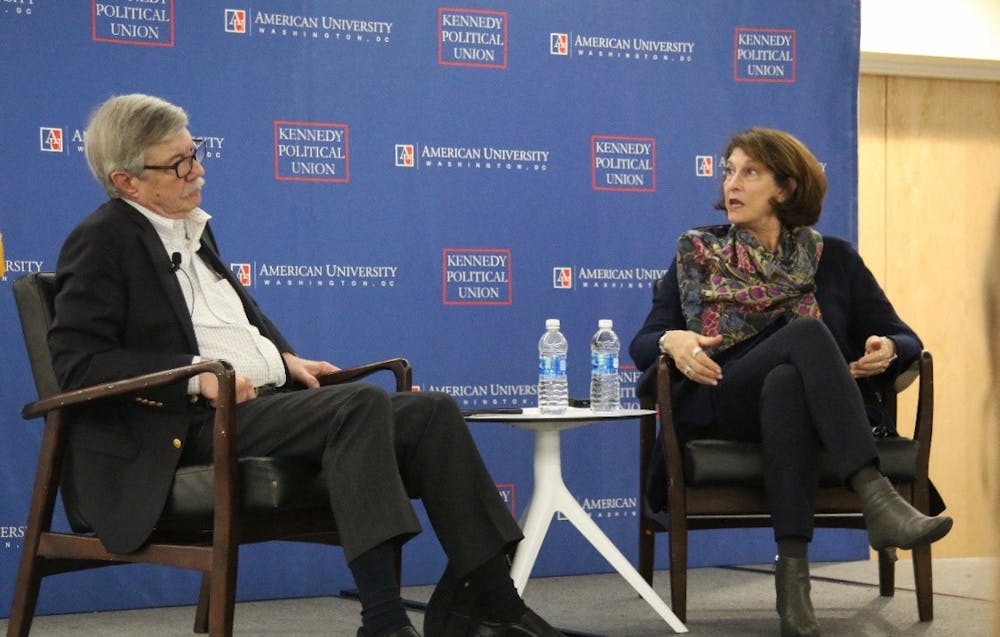Longtime NPR political correspondent Mara Liasson talked about polarization and emerging challenges for journalists at an event with American University’s Kennedy Political Union on March 27.
School of Public Affairs executive-in-residence Ron Elving, a colleague of Liasson’s at NPR and senior editor and correspondent for NPR’s Washington desk, moderated the event.
Liasson detailed her career starting from her early days as a history student at Brown University writing for the weekly publication, Fresh Fruit, to her days at the California public broadcasting station KPFA and her now 39-year-long tenure at NPR. She said she was first drawn to journalism because she loved writing and following current events.
“It was like history was happening and you’re right in the middle of it,” said Liasson.
Working in radio offered Liasson a more creative outlet for reporting since NPR “was really expanding the horizons of what you could do with sound.”
“With radio, you can tell a story that’s pretty limitless,” she said. “Your imagination is filling in all the stuff that TV would put right in front of your face.”
While at NPR, Liasson has reported hundreds of stories, many of which have focused on presidential elections. She covered her first presidential election in 1991 and has covered six since. She said the most challenging election was 2016, as former president Donald Trump rewrote the rules of campaigning and political rhetoric.
“We have a candidate Donald Trump, who has not only questioned but worked very vigorously to undermine basic democratic norms,” said Liasson.
Liasson spoke to the importance of journalists “staying vigilant” during both the Trump and post-Trump era, as polarization and political narratives continue to fracture the American public. According to a poll by Axios, 39 percent of Americans say they don’t trust mainstream media.
“I think many Americans now look to the media for affirmation, not information,” she said.
Looking for affirmation over information is just one of the challenges Liasson sees journalism facing in the future. She emphasized that AI and social media pose threats to journalists and American democracy.
Liasson suggested current and future journalists alike should “try to identify what’s fake and what’s real, but I don’t know how you do that in real time.”
Currently, there is no national legislation in the U.S. prohibiting the use of AI to create journalistic content or to implement any software that detects AI, although social media sites like Meta have attempted to warn users of deep fakes and other potentially doctored posts.
But despite these challenges, Liasson said she sees hope for the future of journalism. She said that the barriers to entry into journalism are much lower now with increased access to technology and more diverse media outlets.
Students, who will experience the future of journalism firsthand, reflected on her talk, saying they learned more about how politics and journalism intersect and increasingly overlap. Alex Holtzapffel, a freshman in the College of Arts and Sciences, said Liasson and Elving’s discussion made him consider how he approaches different sides of the political spectrum and the future of fact-based reporting.
“It’s an interesting discourse to see how we should approach fabrication and lies,” he said.
Whatever the 2024 election and the future holds, Liasson said she believes that to fight this fabrication outlets like NPR must continue telling unbiased stories and connecting with the public through multiple perspectives.
“We have to have a shared set of facts, and then work our way to different opinions as opposed to the other way around,” she said.
This article was edited by Kathryn Squyres, Abigail Turner and Abigail Pritchard. Copy editing done by Luna Jinks, Isabelle Kravis and Ariana Kavoossi.





